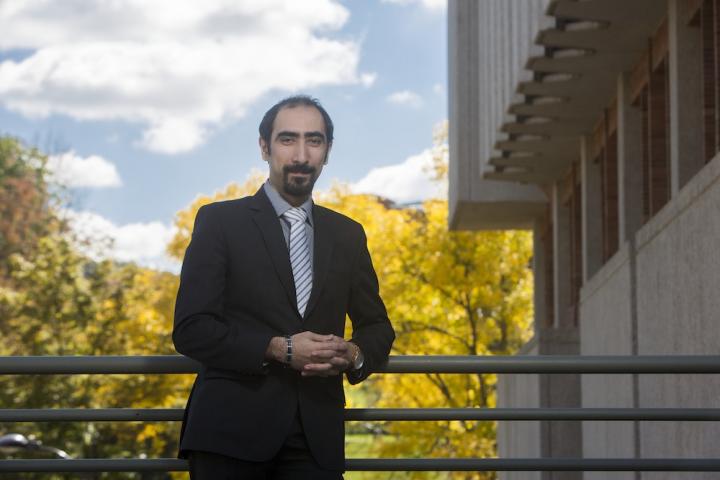
Credit: Jonathan Cohen/Binghamton University
BINGHAMTON, NY – The most dreaded announcement for any airline passenger trying to get home for the holidays has to be a flight delay. Researchers at Binghamton University, State University of New York have devised a new computer model that can more accurately predict delays faster than anything currently in use.
"Our proposed method is better suited to analyze datasets with categorical variables (qualitative variables such as weather or security risks instead of numerical ones) related to flight delays. We have shown that it can outperform traditional networks in terms of accuracy and training time (speed)," said Sina Khanmohammadi, lead author of the study and a PhD candidate in systems science within the Thomas J. Watson School of Engineering and Applied Science at Binghamton University.
Currently, flight delays are predicted by artificial neural network (ANN) computer models that are backfilled with delay data from previous flights. An ANN is an interconnected group of computerized nodes that work together to analyze a variety of variables to estimate an outcome–in this case flight delays–much like the way a network of neurons in a brain works to solve a problem. These networks are self-learning and can be trained to look for patterns. The more variables an ANN has to process, the more categorical those variables are, and collecting historical data slows down an ANN to make flight delay predictions.
The Binghamton team introduced a new multilevel input layer ANN to handle categorical variables with a simple structure to help airlines easily see the relationships between input variables (such as weather) and outputs (flight delays).
The research won't eliminate delays, but it will help airlines inform travelers quicker and more accurately about problems. The new model could also help smaller regional airports become more efficient and able to handle more flights per day.
"Airlines can use the proposed method to provide more accurate delay information to the customers, and hence gain customer loyalty," said Khanmohammadi. "Air traffic controllers at a busy airport can also use this information as a supplement to improve the management the airport traffic."
Researchers trained the new model to pick up on 14 different variables–including day of the week, origin airport, weather and security–that affected arrival times for 1,099 flights from 53 different airports to John F. Kennedy airport in New York City. The new system then predicted delays for hypothetical flights projected to arrive at JFK at 6:30 p.m. on Jan. 21 from a variety of origins and under a variety of conditions.
The new model predicted the length of delays with about 20 percent more accuracy than traditional models and required about 40 percent less time to come to those conclusions.
"Given that the dataset used here is just a small sample of the larger dataset provided by the Bureau of Transformation Statistics (BTS), it is not possible to make conclusive conclusions. Having said that, based on the small sample dataset the biggest cause of delay was previous late arrivals by aircraft," said Khanmohammadi. "For example, if one flight arrives late at LAX in Los Angeles to begin with, its arrival at JFK will be further delayed, and this cascade of late arrivals continues as the aircraft goes from one airport to another and then another and so on."
With the increasing complexity and use of air travel throughout the world, the team plans to continue to explore variables that could be applied to the new model. The group also wants to apply the work beyond flight scheduling and use fuzzy logic–computing based on degrees of truth rather than the usual true/false dichotomy–to expand to more real-world applications.
PhD students Salih Tutun (industrial engineering) and Yunus Kucuk (computer science) were co-authors of the paper.
The study, "A New Multilevel Input Layer Artificial Neural Network for Predicting Flight Delays at JFK Airport," was published in Volume 95 of Procedia Computer Science and presented at the Complex Adaptive Systems Conference in Los Angeles on Nov. 2.
###
Media Contact
Sina Khanmohammadi
[email protected]
@binghamtonu
http://www.binghamton.edu
############
Story Source: Materials provided by Scienmag





